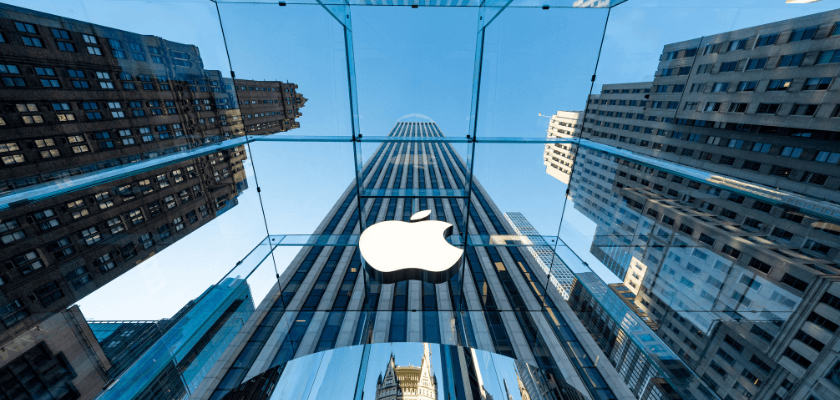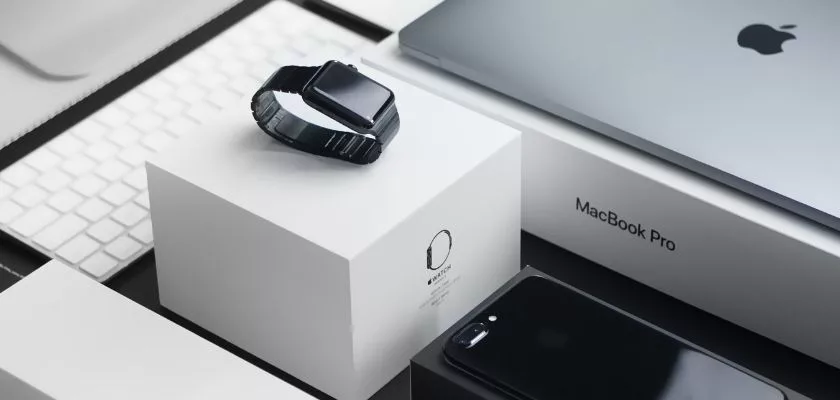The Apple Marketing Playbook: Understanding the Psychology
Do you use Apple products in your daily life? We definitely do – in fact, our entire team at Bold x Collective owns multiple Apple devices! Why is Apple so popular? Because this brand is a true mastermind in...

Do you use Apple products in your daily life? We definitely do – in fact, our entire team at Bold x Collective owns multiple Apple devices!
Why is Apple so popular? Because this brand is a true mastermind in captivating its consumers with its innovative products and marketing strategies. Their approach to branding is not just about “selling” products; it is about promoting a way of life, a belief system, and a sense of belonging. Essentially, we like to look at their products as a part of our daily lifestyles.
In this blog post, we will dive into Apple’s marketing playbook – the psychology behind its strategies and tactics that have turned this brand into a global icon. Let’s get into the specifics of the strategy behind the Apple brand!
Understanding the Importance of Brand Identity
Apple’s success story started with its exceptional brand identity. The Apple logo, a simple yet elegant apple with a bite taken out of it, is one of the most well-known symbols globally. This logo has become synonymous with innovation, design excellence, and a certain level of exclusivity. It is instantly associated with products that are sleek, user-friendly, and ahead of their time. The brand’s identity has played a significant role in establishing its reputation as a leader in the technology industry.
Apple’s brand identity is deeply rooted in the psychology of design. They understand the human desire for simplicity and elegance. It taps into our natural attraction to clean lines, minimalism, and aesthetically pleasing designs. By consistently delivering products that embody these principles, Apple creates a strong emotional connection with its customers. This connection is key to their marketing success.
The Power of Storytelling
Apple has always been known for its exceptional storytelling skills. With iconic campaigns such as “1984” and “Shot on iPhone,” Apple’s marketing strategy revolves around crafting narratives that strike a chord with the audience. These stories typically involve themes like transformation, innovation, and the notion that by choosing Apple, you can embrace your unique perspective.
For instance, the “1984” commercial, which aired during the Super Bowl, portrayed Apple as a revolutionary force breaking free from the conformity of the status quo. It created a sense of rebellion and innovation that captivated the audience. The impact of this commercial was so profound that it remains one of the most iconic in advertising history!
The “Shot on iPhone” campaign, on the other hand, invites customers to be part of the Apple story. By showcasing stunning user-generated content, Apple taps into the creativity and emotional connections of its users. This campaign isn’t just about selling a product; it’s about making customers feel like they’re part of a creative community. This campaign did just that.
The Psychology of Exclusivity
Apple has perfected the art of making its customers feel special. One of the ways they achieve this is through the psychology of exclusivity. When Apple releases a new product, the world watches with excitement. The limited initial supply, long lines outside Apple stores, and the sense of being among the few to own the latest gadget all contribute to this feeling of exclusivity.
Exclusivity taps into the fundamental human desire for social status and distinction. People naturally want to feel unique and important, and owning an Apple product can help fulfill that need. This is why Apple fans are often willing to pay a premium for their products. The psychology of exclusivity also leverages the “bandwagon effect,” where people want to be part of a trend or group. Apple products create a sense of belonging to a club of forward-thinkers and tech-savvy individuals.
User-Centric Design Philosophy
Apple’s marketing strategy also extends to its design philosophy, where the user is always the top priority. Apple products are carefully crafted with the user in mind, ensuring that they are not only functional but also visually appealing and easy to use. This approach aligns with the psychological principle of enhancing user satisfaction and creating a sense of delight.
Apple understands that we want technology to be seamless, intuitive, and enjoyable! When we use an Apple device, we experience a sense of satisfaction, which reinforces our loyalty to the brand. This psychology-driven design approach has been a huge portion of Apple’s success.
Emotional Branding
Apple has mastered the art of emotional branding. They don’t just sell products; they sell experiences and emotions. The emotional connection to the brand is what compels customers to line up outside Apple stores for the latest release. I’m definitely one of those people! When there is a new Apple product, you bet I’ll be in line to get it. And that is what we call “emotional branding.”
Apple products are known for their quality and reliability, which instill a sense of trust in their customers. This trust creates a feeling of security and satisfaction as customers are less likely to encounter the frustration that is common with inferior products. The brand’s reliability reassures customers that they have made a wise decision.
Apple also leverages the emotion of aspiration. Their marketing materials and stores are filled with images of stylish, creative individuals using their products to achieve their goals. When you buy an Apple product, you’re not just buying a gadget; you’re investing in a future where you’re more productive, creative, and successful! Who doesn’t want to experience this feeling? I know my colleagues and I definitely do.

The Use of Color Psychology
Apple’s choice of colours in its marketing and product designs is another element of its psychological strategy. Colour psychology plays a significant role in influencing our emotions and perceptions. Apple’s branding predominantly features a clean, white aesthetic, which conveys a sense of simplicity and purity. White is often associated with cleanliness, modern aesthetics, and perfection.
Additionally, Apple’s use of colour in its product lines, such as the colourful iPhones, celebrates diversity and personalization. Each colour choice allows users to express their individuality while still being part of the Apple community.
The Role of Customer Advocacy
Apple’s marketing strategy includes building a community of loyal customers who become advocates for their products. This approach is based on the principle of social proof, which suggests that people are more likely to trust and adopt a brand or product when they see their peers endorsing it. By fostering a strong customer base that loves and advocates for their products, Apple taps into this psychological phenomenon to increase their customer base and brand loyalty.
Apple’s dedication to customer service, product quality, and seamless user experience results in highly satisfied customers who willingly promote the brand. They become advocates who spread the Apple message through word-of-mouth and social media. This organic form of marketing is incredibly effective because it leverages the power of personal recommendations.
Our Takeaways
Apple’s marketing strategy is a fascinating case study of how a company can move beyond simply selling products and create an entire culture, lifestyle, and sense of belonging for its customers. Through their expertise in brand identity, storytelling, exclusivity, user-centric design, emotional branding, colour psychology, and customer advocacy, they have become a global icon and one of the most valuable brands in the world!
The key takeaway from Apple’s success is that it’s not just about the products themselves; it’s about the experiences, emotions, and relationships they create with their customers. Apple has made us feel like we’re part of something bigger, and that, in itself, is a powerful psychological tool that continues to shape the way we view and interact with technology in the digital age. Whether you’re an Apple enthusiast or not, there’s no denying the impact of their marketing psychology on our world.
Want to talk marketing? Get in touch with the team at Bold x Collective – we’d love to hear from you!

 Koichiko
Koichiko 










![Consumer Behavior Statistics You Should Know in 2022 [New Data]](https://blog.hubspot.com/hubfs/consumer%20behavior%20statistics.jpg#keepProtocol)


_1.png)



















